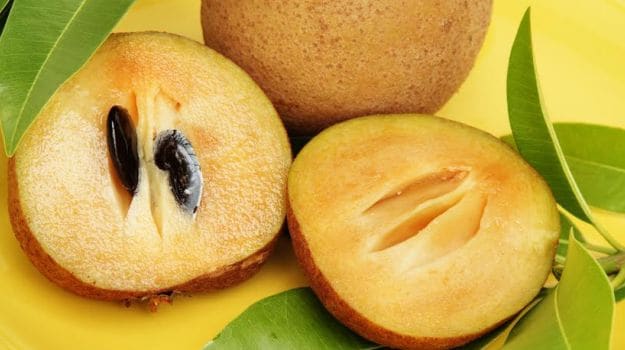We have something to thank the Spanish for. Had it not been for them, the chickoo, chikoo or sapota would have perhaps never come to India. With its roots in Mexico, Easter Guatemala and Belize (on the eastern coast of central America), the Colonisers took it to the Philippines from where it travelled to the rest of Asia, making its way into India only in the late nineteenth century.
In India, the sapota is grown in many states - Karnataka, Gujarat, Maharashtra, Tamil Nadu, West Bengal and Andhra Pradesh. Incidentally, Karnataka is known to be the highest grower of the fruit, followed by Maharashtra. The varieties of sapota in India have funny names - Kali Patli, cricket ball, Baramati, Pili Patli, Dwarapudi, Chhatri and so on. Now while the fruit isn't really cooked, or even used in salads (except for maybe fruit salads), probably due its supremely dominating flavours, the sapota can be blended into milk or yogurt and had as a smoothie. Or you could make a jam out of it too. There are quite a few interesting recipes out there, from chickoo halwa, kheer, to even barfis. Honestly, the best way to eat this fruit is by itself.
And she was right. While none of us cared about the health benefits of the fruit while growing up, it's important to know why you should eat a few sapotas every time it's in season. Here are 10 good reasons:
1. Rich in Vitamin A and C
Did you know that? A sapota a day might just keep the eye doctor away. Okay maybe we are exaggerating a bit, but the vitamin A does keep our eyes healthy, and you might see the benefits of it when you're a lot older. And as for vitamin C, its benefits are best known. It keeps your immunity strong, skin in good condition, kills free radicals, prevents heart disorders etc.

2. Energy Provider
The natural fructose and sucrose content in sapota can give your body a lot of energy. So if you have a busy day ahead, grab a sapota before you leave home for an energy boost.
3. Anti-Inflammatory
Sapota has a high content of tannin, which in turn works as a natural anti-inflammatory. Again, eat regularly to see results.
4. Helps in Digestion
It keeps your digestive system in check, and prevents a condition that bothers urban India a lot - irritable bowel syndrome (IBS). And the dietary fibers make the sapota a laxative, therefore helping to fix constipation problems.

5. Source of Antioxidants
Apart from being rich in dietary fiber, vitamins A and B, and C, the sapota is also packed with anti-oxidants. And therefore, it's reported to prevent certain types of cancer such as oral cavity cancer.
6. Good for the Bones
Did you know that this delicious fruit is rich in calcium, phosphorus, and iron, and therefore keeps your bones strong? If you've eaten the sapota regularly, you might not need supplementary pills later in life. It is a good source of minerals like iron, folates, calcium, magnesium, potassium, zinc, copper, phosphorous, selenium etc which are very essential for facilitating various body functions including proper bone growth.

7. Controls Blood Pressure
The magnesium in sapota keeps the blood vessels up and running, and the potassium regulates blood pressure and circulation. It's also good to treat anaemia with, as it's also rich in iron.

8. Good for Moms-to-Be
Packed with electrolytes, Vitamin A and carbohydrates, sapotas are good for expecting, and even lactating mothers. If you're pregnant, a sapota can help to deal with morning sickness and dizziness. And because it helps in the production of collagen too, it keeps stomach related disorders at bay.
 9. Controls WeightIf you're on a diet, a sapota might work to rid your body of water retention. It regularises your metabolism, and works to your advantage if you're trying to lose weight.
9. Controls WeightIf you're on a diet, a sapota might work to rid your body of water retention. It regularises your metabolism, and works to your advantage if you're trying to lose weight.
10. Beauty Benefits
Eating the sapota regularly helps to remove toxins from your body, and is thus great for your skin and hair; it keeps them healthy and moisturised. However, eat it for better results, instead of putting it on your face or in your hair, unless you're doing it every day. In fact the sapota is known as a 'happy' food; it helps promote the production of collagen, and prevents the growth of deep wrinkles. You'll thank it later when you're order.

Disclaimer:
The opinions expressed within this article are the personal opinions of the author. NDTV is not responsible for the accuracy, completeness, suitability, or validity of any information on this article. All information is provided on an as-is basis. The information, facts or opinions appearing in the article do not reflect the views of NDTV and NDTV does not assume any responsibility or liability for the same.









